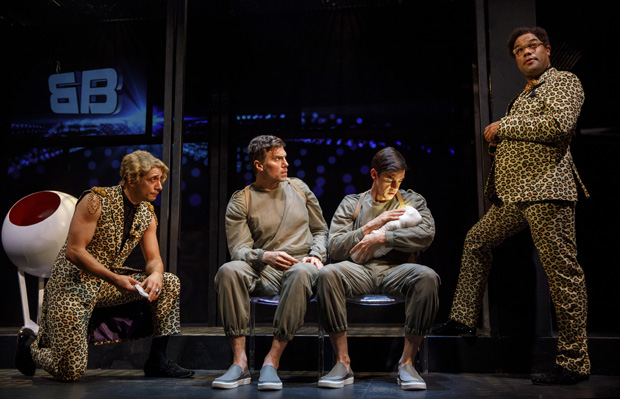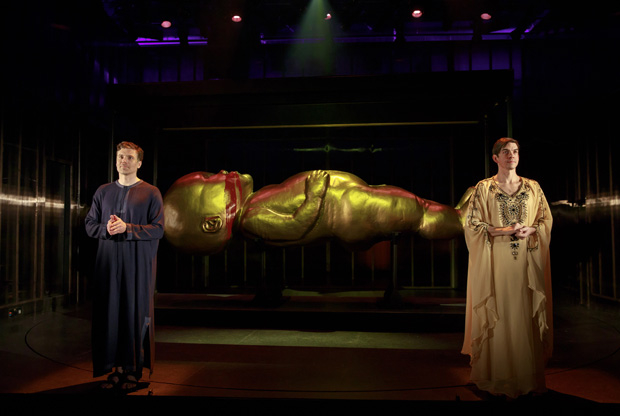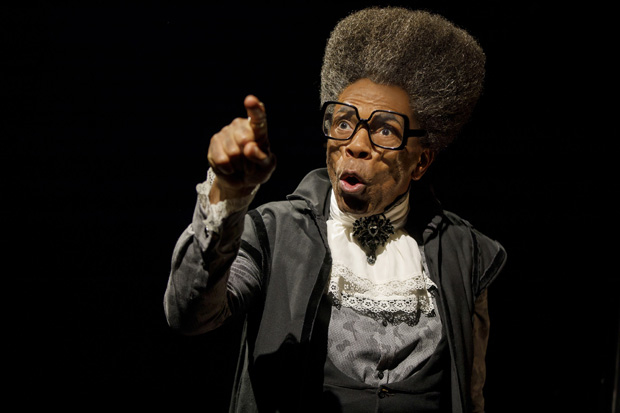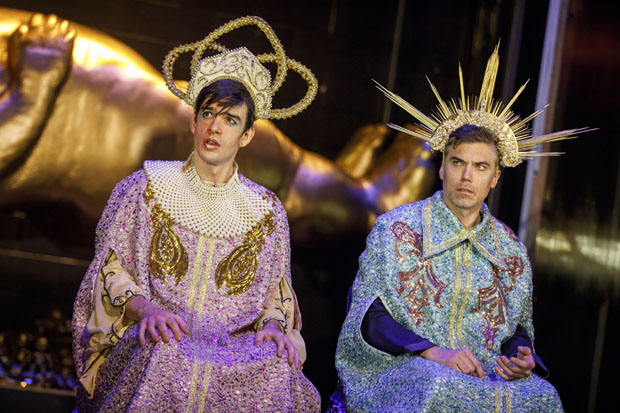
(© Joan Marcus)
"Dude, I’m pregnant" is something no man ever wants to hear from another dude. But a dude does indeed utter that fateful phrase in the opening moments of Robert O'Hara's Mankind, now making its world premiere at Playwrights Horizons. The spectacle of a pregnant man in a time after women should be the basis of a wicked satire. What could be more ironic than a world in which the patriarchy's oppression of the female body has forced all men to go gay? We wait for comic gold to materialize, but it never does as Mankind plods along for a leaden two hours.
These expectations may seem unfairly high, but O'Hara's reputation as one of America's funniest playwrights precedes him. His two previous works, Barbecue and Bootycandy, took aim at popular perceptions of identity, pulling the camera back to show how they are exploited by the entertainment industry. Barbecue was especially caustic in its portrayal of how Hollywood congratulates itself for producing "challenging" work that really just reinforces our preconceived notions, an observation that looks awfully astute in the moonlight. Mankind offers neither the wit nor bite of O'Hara's earlier plays. Certainly, Playwrights Horizons artistic director Tim Sanford does the production no favors by ending his program note with the line, "Prepare to have your minds blown, my friends." My mind remained thoroughly unblown by a play that is not nearly funny enough to compensate for all its plot deficiencies.

(© Joan Marcus)
As mentioned before, the story takes place following the extinction of "whoa-man" (which is how all the actors pronounce it). Men have evolved to bear children, allowing Mark (Anson Mount) to unintentionally impregnate his casual sex partner, Jason (Bobby Moreno). The two decide to have an abortion, even though they have been outlawed since before the extinction. They are thwarted in their efforts by an oppressive nanny state and Jason is forced to give birth…to a girl. The birth of the first female child in generations gives rise to a religious cult of "feminists" — but will the government tolerate this outlaw faith?
Through ceremonial robes, golden idols, and monotonous prayers, O'Hara dedicates long stretches of stage time to his hoary takedown of religion (but really just Catholicism). The laughs are few and far between as these scenes sputter along, inducing confusion and, finally, fatal indifference. A good director would have spotted the problem immediately and insisted on a tighter script. Regrettably, O'Hara serves as his own director, resulting in a saggy presentation that betrays an almost religious reverence for the text.

(© Joan Marcus)
Moreno and Mount are joined by four supporting actors (André De Shields, Stephen Schnetzer, Ariel Shafir, and David Ryan Smith) playing multiple roles, and there are glimmers of humor in those performances. Shafir makes us chuckle with his vocal representation of TV host Bob, a genderqueer version of Tom Brokaw. Also, the sight of De Shields in a fright wig playing a particularly theatrical prosecutor is just plain hilarious. Still, no characters ever rise above a broadly drawn sketch, not even our inscrutable central twosome.
High production values do little to illuminate a world that only feels half-imagined. Between Clint Ramos's ever-rotating 3D puzzle set, Dede M. Ayite's Illuminati eleganza costumes, and Lindsay Jones's epic transition music, it all feels like a bad Hunger Games spin-off. That's not so-bad-it's-good, either. If that were the case, we would be laughing more.
Some of the biggest laugh lines come when Mark or Jason try to unpack their all-male family histories: "My father and father divorced when I was 15 and my father took me to go live with his fathers," Jason explains. O'Hara seems to be suggesting that our aggressive drive toward gender neutrality in English might just be a recipe for confusion. Instead of reducing our language to one pronoun for all, how about inventing more pronouns to more fully capture the expanding range of gender expression?

(© Joan Marcus)
In his take on the feminist cult, which observes a commandment to "kill all non-believers," O'Hara dances around an uncomfortable truth about humanity: Intolerance is our default setting. Even the most well-meaning and progressive movements eventually become infected by an age-old tribalism. We simply don't think bringing justice to one group counts unless we're simultaneously oppressing another. Man's lack of kindness is always a worthy target for satire, but Mankind disappointingly misses the mark.








